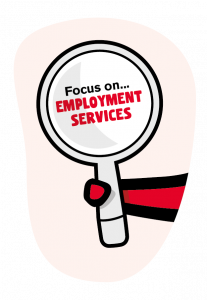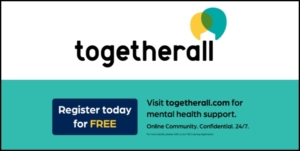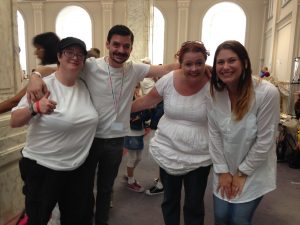Opening the doors to our Kirklees Employment Service
 This week we have been hearing from staff and people we support all about what it’s like to work within and be supported by one of our Employment Services. Our employment services help people to maintain or gain meaningful employment, training, education or volunteering opportunities that are right for and tailored to them. We deliver 38 employment services across England – and one of them is Kirklees Employment Service. We’ve already heard this week from some of our Employment Advisors at Kirklees over on our social media. Today we’ll be getting even more insight into the support that the service delivers, as well as hearing from our Kirklees Service Manager about what’s coming up next for the service.
This week we have been hearing from staff and people we support all about what it’s like to work within and be supported by one of our Employment Services. Our employment services help people to maintain or gain meaningful employment, training, education or volunteering opportunities that are right for and tailored to them. We deliver 38 employment services across England – and one of them is Kirklees Employment Service. We’ve already heard this week from some of our Employment Advisors at Kirklees over on our social media. Today we’ll be getting even more insight into the support that the service delivers, as well as hearing from our Kirklees Service Manager about what’s coming up next for the service.
So, what does the support look like at our Kirklees Employment Service? Their team of staff let us know…
Our employment advisors work with individuals aged 18 and over experiencing mental ill health and/or hidden disabilities. We work on a 1-2-1 basis to form an individual plan on how we can work together to achieve their goals. We provide practical employment advice and support around identifying skills, finding the right job for that person, creating CVs, interview preparation and much more, including retaining employment.
There’s so much more we do in between as well; we listen to people’s worries around employment and their confidence and skills, and we really focus on empowering people to see their own value and strength – there’s really nothing better than watching someone learn to realise that they can do these things and achieve their goals.
Without a doubt Kirklees Employment Service has a huge impact on the people they support – but what do they have to say about it?
“I was given so much support and encouragement that I considered a career in mental health support to try and help people as much as I was helped. I’m now a support worker feeling very satisfied in a job I might not even have considered if not for my advisor.” Person we support
“I have been able to find new volunteering opportunities which will strengthen my CV and have applied for jobs with the help of my employment advisor. Without her it would have been an impossible task.” Person we support
“The support that I have received from my employment advisor has enabled me to live a more confident and happy life. She has provided me with support and encouragement.” Person we support
“I felt like I was alone and back to square one, but my employment advisor made me feel like I mattered and always called at precisely the right time when I needed some help and guidance the most. I would definitely recommend the Richmond Fellowship for anyone going through difficulty with mental health.” Person we support
Kirklees Employment Service very recently won their contract to continue delivering this important support in their area. So, what’s coming up for service as they continue delivering support? Our Service Manager at Kirklees gave us an update.
“We recently won our contract to continue delivering our employment service in Kirklees. Towards the end of last year, I was lucky to be involved with the retendering of the service, working alongside our central service team. To support with this process we involved all staff, volunteers, customers, referrers and partners. We supported commissioners with consultation sessions, and made sure to use the feedback of people we support to help with identifying the needs of our service users to create a vision of a new employment service from April 2022. I was happy to see commissioners had taken on board people’s feedback from the consultation process, and the new service specification reflected the feedback of people we support.
We are always striving to increase the support we can offer to the community. As we begin a new year, and new contract, we are going to be increasing our offer to employers which will show us providing tailored support to organisations around mental health in the workplace, and support with the retention of employees.
We are linking up with far more organisations across Kirklees to provide our peer workshops around mental health and wellbeing into the community. We are also going to be providing community transition and integration workshops to minority groups.
We are excited about our new website that is currently under construction. The website will help us to reach even more people across Kirklees. The website will host some online guides to developing employability like a CV builder and interview tips. People we support will be able to seamlessly book onto peer support sessions and find out which service is best for them. The website will also host our new online referral system to services.
I feel lucky and privileged to be a part of shaping the future Kirklees Employment Service and supporting people across Kirklees.”
In 2021 our Kirklees Employment Service supported 472 people to find new employment, training, education or volunteering opportunities, as well as retain their current work. We can’t wait to see the impact they make this year – congratulations to the Kirklees team!
All our Employment Services put in important and necessary work to help people with mental ill health access employment opportunities. We are proud of the work they put in to inspire recovery. Check out employment services in your local area here, or find out more about Kirklees Employment Service here, as well as how to be referred to the service.
Stay tuned to hear more from our other Employment Services across England this week. Including our Bath, North East Somerset, Swindon and Wiltshire IPS Employment Service in this month’s Radio Sparky Podcast. Follow us on Twitter and like our Facebook page to keep up to date.

























